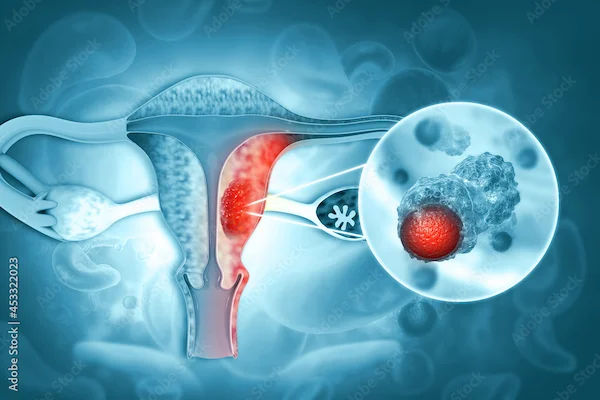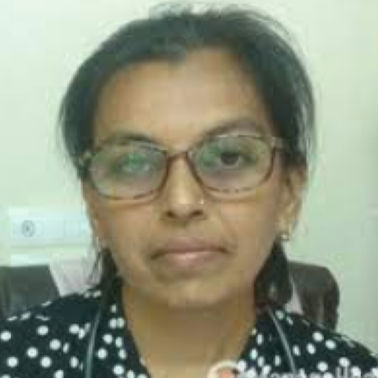Endometrial Cancer Returning After Hysterectomy
Concerned about endometrial cancer returning after hysterectomy? Understand the signs of recurrence, risk factors, common locations for spread, and the importance of follow-up care to monitor your health post-treatment

Written by Dr.Sonia Bhatt
Last updated on 20th Jul, 2025

Introduction
Endometrial cancer is one of the most common cancers affecting the uterus, and many women undergo a hysterectomy (surgical removal of the uterus) as part of their treatment. While this procedure is often successful in eliminating cancer, there are cases where the disease may return. If you or a loved one is facing this situation, it’s natural to feel concerned. This article will help you understand why endometrial cancer can come back, what signs to watch for, and how to manage it effectively.
Can Endometrial Cancer Return After a Hysterectomy?
Yes, in some cases, endometrial cancer can return even after a hysterectomy. This is called recurrent endometrial cancer. The risk depends on factors such as:
The stage and grade of the original cancer.
Whether cancer cells had spread beyond the uterus before surgery.
The type of treatment received (surgery alone or with radiation/chemotherapy).
Recurrence can happen in different areas, such as:
Locally: Near the original site (vagina, pelvic area).
Regionally: In lymph nodes.
Distant: In other organs like the lungs, liver, or bones.
Signs and Symptoms of Recurrence
Being aware of changes in your body is crucial. If you notice any of the following symptoms after a hysterectomy, consult your doctor:
Vaginal bleeding or discharge (if the cervix was not removed).
Pelvic or abdominal pain that doesn’t go away.
Unexplained weight loss.
Swelling in the legs (could indicate lymph node involvement).
Persistent cough or breathing difficulties (if cancer has spread to the lungs).
Early detection improves treatment success, so don’t ignore unusual symptoms.
Consult Top Gynaecologists
Why Does Endometrial Cancer Return?
Several factors contribute to recurrence:
Incomplete Removal: If cancer cells were left behind during surgery.
Aggressive Cancer Types: Highgrade tumors are more likely to return.
Spread Before Surgery: If cancer had already spread to lymph nodes or other tissues.
Lifestyle & Genetics: Obesity, hormonal imbalances, and genetic conditions (like Lynch syndrome) increase recurrence risk.
How Is Recurrent Endometrial Cancer Diagnosed?
If recurrence is suspected, your doctor may recommend:
Imaging Tests: CT scans, MRIs, or PET scans to locate cancer.
Biopsy: Removing a small tissue sample for testing.
Blood Tests: Checking tumor markers like CA125.
Treatment Options for Recurrent Endometrial Cancer
Treatment depends on where the cancer has returned and your overall health. Options include:
Surgery: If the recurrence is localized, removing the tumor may be possible.
Radiation Therapy: Used if cancer is in the pelvic area.
Chemotherapy: Helps control cancer that has spread.
Hormone Therapy: For hormone-sensitive cancers.
Immunotherapy/Targeted Therapy: Newer treatments that help the immune system fight cancer.
Your doctor will create a personalized plan based on your condition.
Lifestyle Tips to Reduce Recurrence Risk
While not all recurrences can be prevented, healthy habits can help:
Maintain a Healthy Weight: Obesity increases estrogen levels, which can fuel cancer growth.
Stay Active: Regular exercise improves overall health and reduces cancer risk.
Eat a Balanced Diet: Focus on fruits, vegetables, whole grains, and lean proteins.
Avoid Smoking & Limit Alcohol: Both can increase cancer risks.
Regular Followups: Attend all posttreatment checkups to catch any changes early.
Emotional Support and Coping Strategies
A cancer recurrence can be emotionally challenging. Consider:
Joining a Support Group: Talking to others who understand your experience can be comforting.
Therapy or Counseling: Helps manage anxiety and depression.
Staying Connected: Lean on family and friends for support.
When to See a Doctor?
If you experience any unusual symptoms after a hysterectomy, don’t wait—consult your doctor immediately. Early intervention improves outcomes.
Need Help? Apollo 24|7 is Here for You
If you have concerns about endometrial cancer recurrence or need a second opinion, Apollo 24|7 offers expert consultations and diagnostic tests. You can:
Book an online consultation with a gynecologic oncologist.
Schedule followup tests to monitor your health.
Taking proactive steps can make a big difference in managing your health. Stay informed, stay vigilant, and don’t hesitate to seek help when needed.
Consult Top Gynaecologists
Consult Top Gynaecologists

Dr Swatika Kumari
Obstetrician and Gynaecologist
19 Years • MBBS, DGO, DNB Obstetrics & Gynaecology
Nashik
Apollo 24|7 Clinic - Maharashtra, Nashik

Dr. Priyanka Surisetty
Obstetrician and Gynaecologist
8 Years • MBBS, DGO
Visakhapatnam
Apollo 24|7 Clinic - Andhra Pradesh, Visakhapatnam

Dr. Veena H
Obstetrician and Gynaecologist
16 Years • MBBS DGO
Bangalore
Apollo 24|7 Clinic - Karnataka, Bangalore

Dr. Mona Yadav
Obstetrician and Gynaecologist
19 Years • MBBS, MD (Obstetrics & Gynaecology)
Dombivli
Nulife multispeciality, Dombivli

Dr. Asha Rani Singh
Obstetrician and Gynaecologist
24 Years • MBBS DGO
Delhi
Dr Asha Rani Singh Clinic, Delhi
Consult Top Gynaecologists

Dr Swatika Kumari
Obstetrician and Gynaecologist
19 Years • MBBS, DGO, DNB Obstetrics & Gynaecology
Nashik
Apollo 24|7 Clinic - Maharashtra, Nashik

Dr. Priyanka Surisetty
Obstetrician and Gynaecologist
8 Years • MBBS, DGO
Visakhapatnam
Apollo 24|7 Clinic - Andhra Pradesh, Visakhapatnam

Dr. Veena H
Obstetrician and Gynaecologist
16 Years • MBBS DGO
Bangalore
Apollo 24|7 Clinic - Karnataka, Bangalore

Dr. Mona Yadav
Obstetrician and Gynaecologist
19 Years • MBBS, MD (Obstetrics & Gynaecology)
Dombivli
Nulife multispeciality, Dombivli

Dr. Asha Rani Singh
Obstetrician and Gynaecologist
24 Years • MBBS DGO
Delhi
Dr Asha Rani Singh Clinic, Delhi




